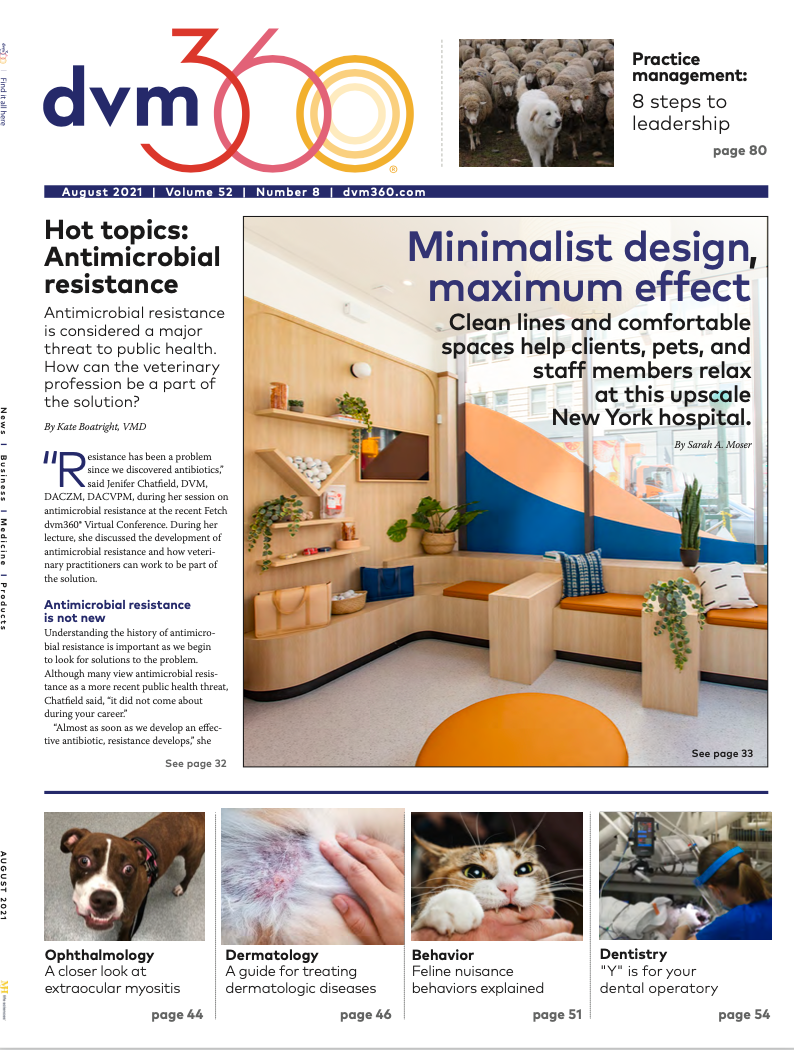A look under the hood of a corporate practice purchase
From deciding to sell through the closing to the impacts on the veterinary team, discover the ins and outs of corporate practice purchase.
It’s an unexpected, often turbulent event that happens seemingly every day. The owner of a long-established veterinary practice assembles the team for a lunchtime meeting and breaks the news: “I’ve decided to sell the hospital to a corporate group.” The lay staff wonders whether this will mean a raise or perhaps more vacation time. The associates and LVTs aren’t sure what to think—not at all certain if the move will help them, hurt them, or just change the office culture in an entirely unpredictable way.
But in almost every case, the decision to sell seems sudden to the staff, something that has occurred out of the blue. However, nothing could be further from the truth. Corporate clinic acquisitions are the product of months of considered, stressful contemplation and scrupulously planned execution.
Here’s what goes on in the months before that momentous lunchtime “big reveal.”
The decision to sell and the NDA
Staff members must recognize that a veterinary hospital owner’s decision to sell is probably the biggest decision they have ever made, short of marriage or becoming a parent. The choice has cost the seller many sleepless nights and hundreds of hours of research into the financial and personal impact of that decision.
Very likely, once the tentative decision has been made, the owner(s) of the practice are faced with the burdensome choice of whether to look for an individual buyer or entertain offers from corporate consolidators (there are scores of such corporations, both large and small) in hopes of finding the right culture fit, plus the most enticing monetary offer.
Then, after a few final contestants are identified, the selling doctor will sign a mutual non-disclosure agreement (NDA) that ensures none of the players (seller, potential buyer, lawyers, accountants, etc.) will reveal confidential information regarding either side of the pending deal.
The LOI and due diligence
The steps after signing an NDA are fairly consistent, except that corporate veterinary groups usually dive far deeper into the details of the practice’s finances than private buyers do. In addition, the paperwork is more voluminous and complicated. The owner frequently enters into what can be a protracted negotiation dance with multiple potential buyers—each side making an effort to obtain the best terms among many “offer packages” from suitor(s).
The product of this financial mating ritual will be a letter of intent (LOI), describing in a few pages the general terms of the deal that is to be carried out. An LOI is not a contract, and this document is rarely legally enforceable, except that it usually requires the seller to stop dealing with any other buyer until the deal is either closed or aborted.
After the signing of an LOI, the real back office work begins for both the corporate consolidator and the practice seller. A plethora of financial information must be exchanged, the so-called “due diligence,” which usually must be carried out in strict secrecy on both sides. Remember, at this point the buyer needs to ascertain that the clinic is as profitable as its owner claims it is. And the seller? They need to ensure the financial information is transmitted to the corporation without the staff knowing (sometimes because the corporate buyer insists, sometimes because the seller still hasn’t entirely decided to sell, knowing that she can still revoke the LOI until the definitive sale contract is signed).
Logistical hurdles
There are innumerable obstacles that can potentially occur before the final closing. Part of the reason for carrying out due diligence is to spot challenges to the deal’s consummation, including those arising from unexpected sources. Each of these stumbling blocks is a looming nightmare for the seller, as they become more and more emotionally invested in the life change they have embarked upon. Here are some examples of flies in the ointment that our office has experienced while counseling sellers through the process.
- Reluctant landlord: A private landlord may choose not to grant a lease assignment to a clinic purchaser—sometimes they want the lease to run out so the property can be leased for another, more lucrative purpose.
- Zoning complications: The corporate consolidator may want to expand the footprint of the target clinic only to find that zoning for veterinary use has changed and that only the existing facility has been grandfathered for such use, with the result that any expansion would be noncompliant with current local rules.
- Asset value disagreements: How the sale price is taxed depends on what value is assigned to each asset purchased. The buyer and seller are legally required to stipulate to the IRS what both agree are the values of such items as equipment and goodwill. Generally speaking, valuations that are good for the buyer are bad for the seller and vice versa. Plus, drawn-out negotiations have the potential to scuttle the deal.
Onboarding associates and staffers
Shortly before the closing—the moment when final sale documents are signed and the sale proceeds are wired to the seller’s bank account—the fact of the sale must be revealed to the entire staff. Oftentimes, associate veterinarians are notified a little earlier than the rest of the employees, as they often need time to review their newly proposed employment contracts with the acquiring corporation or private buyer.
In a corporate clinic acquisition, the consolidator buying the business usually sends an advance team to the practice to answer questions and allay fears of possible pay cuts, reductions in hours and/or benefits, and so on. Although this may seem like simply an effort to keep nervous employees from leaving, it can reveal the potential positive impacts of the acquisition by “big business.”
Depending on the acquiring corporation, the sale may well benefit the doctors and staff when a big venture, capital-fueled veterinary juggernaut is the buyer. For example, the new owners may institute better retirement arrangements, such as a 401(k) plan with matching employer contributions. Some consolidators streamline the schedules of associates and lay staff, providing a better work/life balance that may mean a great deal to some veterinarians and the practice team. The transition can also present discouraging challenges for some of the staff and lead to team members electing to move on to other employment.
Closing and integration
Shortly after the owner signs the mountain of legal paperwork exchanged at the closing (now usually done by electronic means, not with a dozen lawyers sitting at a mahogany table as in the pre-web days), a major morphing of clinic business systems takes place. The new owner changes passwords, enables new bank accounts, and installs new software. They institute new employment policies as well—something of a shake-up, but sometimes actually welcomed in a practice where true hands-on management had been sorely lacking.
It can take up to a year or more for everyone to feel entirely comfortable with the corporation’s new way of conducting business. And some staffers will decide to leave or retire rather than embrace a new way of doing things. From that point on, however, it is up to the new management to empower the team and make the practice take wing, or to stumble and watch it languish.
Christopher J. Allen, DVM, JD is president of the Associates in Veterinary Law P.C., which provides legal and consulting services exclusively to veterinarians. Allen serves on dvm360 magazine’s Editorial Advisory Board.

